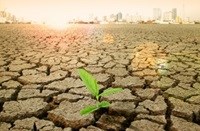Climate change is a subject that no sector can afford to neglect. In less than six months, Paris promises to be a battlefield of agendas as the United Nations Framework Convention on Climate Change (UNFCCC) Conference of the Parties (COP21) kicks off with the aim to replace the Kyoto Protocol. The stakes are high and farmers want their views to be heard.
The 2015 SACAU Annual Conference, held in Mahe, Seychelles on 25 and 26 May 2015, left delegates with the realisation that farmers and researchers need each other and should work together towards combating the challenges of climate change.
SACAU CEO, Mr Ishmael Sunga, emphasised that the organisation is aiming to increase the capabilities of farmers and farmer organisations to navigate their way into the future in order to efficiently deal with the unique and complex challenges ahead. "Agriculture is a long-term journey and we believe in the role of science to propel our members into the future. The reality of climate change will have a huge impact on the sector, and as such not spare our soils, forests or fisheries' which form the basis of discussions at this year's conference," he said.
Climate change on the international agenda
The conference was officially opened by Mr Wallace Cosgrow, Minister of Fisheries and Agriculture of Seychelles, who highlighted the importance of political support for Africa's climate change initiatives and the need for an inclusive process for progress.
Agriculture has been cited as one of the main contributors to greenhouse emissions and a major driver of deforestation. The sector continues to be painted as both the villain and hero in the climate change debate, despite it having the most to lose from changing weather patterns. Deliberations at the conference set the foundation for a united and firm position from Southern Africa's farmers for COP21 at the end of the year.
SACAU President, Dr Theo de Jager, informed delegates that the organisation managed to decisively put climate change on the international agenda over the years, insofar as it impacts on farmers. "This year is the final round, we must make this work. Discussions from the conference will go into COP21 as the voice of farmers of Southern Africa. What we need is a firm agreement, which must be digestible to the smallest of farmers in the region," he emphasised.
Africa will need to adapt
Dr James Kinyangi, from CGIAR Climate Change Agriculture and Food Security (CCFAS) set the scene on the climate change debate by pointing out that large parts of Africa will no longer be suitable for maize production in the coming years due to climate change. "A focus on adaptation and diversification from maize is required. A transition to livestock based systems is inevitable as well as a need to promote transformation to animal protein, through improved livestock farming systems," he explained.
Africa is facing a serious challenge of a rapidly growing young population with low-calorie intake confronted by increased climate changes (floods, cyclones, and drought) that is negatively affecting production.
Fisheries and forestry
Dr John Mmochi, from the Institute of Marine Resources at the University of Dar es Salaam, informed delegates that aquaculture is the fastest growing source of animal protein, increasing 12 fold over the past three decades. However, Africa's contribution to world fish trade is very small despite its huge resource base.
"This is due to our limited access to deep water fishing due to lack of appropriate vessels and low capacity for policing exclusive fishing zones. This has led to foreign vessels exploiting lucrative deep waters while Africans end up fishing in breeding zones close to the coast. We are fishing in the breeding zones, fishing the juveniles. We need to empower ourselves to fish in open seas/deep waters," he explained.
Agroforestry at the conference was widely recognised as "climate smart" and it's potential to be a major additional source of income was highlighted. It was noted that farmers can get more money from forestry than crops if they plant the right trees and use good quality seed. Tree or crop systems (agroforestry) also offers viable opportunities for a transformation towards climate-smart agriculture.
Speakers at the conference also emphasised a need for innovation in the management of rangelands, as the conventional understanding of the carrying capacity of rangelands needs a review. Delegates were informed that ultra-high density grazing offers immense opportunities for maximising the use of rangelands, whilst minimising selective grazing, bush encroachment, and improving the quality of grazing and profit per hectare in livestock systems.

































